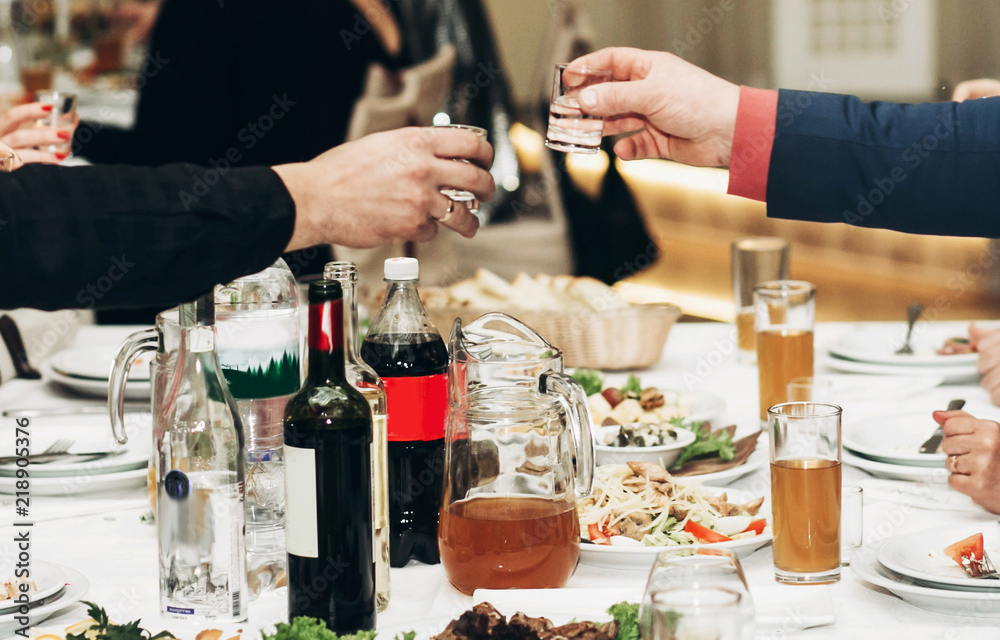Lots of our clients are social people – whether they like to go out to restaurants, have people over to their home, or go to other people’s homes. And along with being social comes alcohol. Nobody is really surprised that it gets in the way of their health and fitness goals, yet we still do it.

In this article, we’ll discuss:
- How to minimize the negative effects of alcohol on your health and body composition.
- How to reduce your consumption.
Minimizing the Negative Effects of Alcohol
This is not going to be an article on all the negative health effects of alcohol – you already know that, and I’m not your parent. Instead in this section, we’ll discuss how to mitigate the negative effects of alcohol if you don’t want to cut down. In the next section, we’ll discuss how to cut down if that’s what you want.
Strategy 1: Plan for It
If you want to drink, then plan on drinking. Literally – put it into your calendar. If you use nutrition tracking apps (their only value is being mindful of what you’re eating – because as nutrient calculators, their accuracy is atrocious).
The biggest impact on overall health is total calories. How many calories should you be getting? If you’re trying to maintain your weight (as opposed to lose weight or gain weight), your caloric requirements are your bodyweight in pounds, multiplied by 15, and add in whatever you spend on exercise. In other words, if you weigh 150 pounds, your maintenance calories without exercise are around 2750. More if you exercise.
After you have your caloric requirements, simply subtract whatever you plan to drink. You want to have 3 glasses of wine? Each glass of wine is about 120 calories. If you want to have 3 glasses of wine, subtract 360 calories. That leaves you with 2390 calories. Some of that should be protein (as for how much protein, just check out the protein calculator on my site), but the rest is largely up to you.
Want to have 2 cans of beer? A single can contains about 150 calories. So 2 cans are 300 calories. Subtract that from your maintenance calories. And again, the rest is up to you.
Strategy 2: Cheat Meal Strategies
Treat your alcohol consumption as a cheat meal. I recorded a video on my top 20 cheat meal strategies, so check those out.
Strategy 3: Nutrients
Alcoholic drinks (basically all of them – beer, wine, vodka, etc.) are void of vitamins and minerals. If you are having 360 calories of wine, that’s replacing 360 calories of foods that contain vitamin and minerals. As a double whammy, not only are they void of vitamins and minerals, they make you lose the vitamins and minerals already in your body.
According to this study, you lose vitamins B1, B2, B6, B9, B12, C, A, D, E and K. You lose some minerals as well, like zinc, iron, magnesium and selenium. No bueno. The significance of those losses depends on:
- The amount of alcohol you consume.
- The supplements you take (did I mention to take a multivitamin?).
- Your overall diet.
In those cases, it’s important to replace both what you would have gotten from real food, as well as what you lost by consuming the alcohol. So take a multivitamin.
If you drink occasionally (say 1-2 times per week), it’s probably not that big of a deal – you don’t need the multivitamin. But lots of our clients are businesspeople and executives. And the purpose of their drinking is social/business – wining and dining clients. In fact, one executive that I interviewed for my book, The Fit Executive has 2-4 drinks every night – 7 days a week. Somebody like that better take a multivitamin.
As a general rule, if you have alcoholic beverages more than twice a week, you should probably have a multivitamin. Or, if you do only drink twice a week, but it’s 3+ drinks each time, then you should probably also use a multivitamin.
The multivitamin won’t negate the effects of alcohol on your body fat, but at least in theory, it should mitigate the negative effects of alcohol on your overall health (including your liver and brain).
How to Reduce Your Alcohol Consumption
Sometimes you know that alcohol is not good for you, but you want to keep it in your diet for whatever reason. The previous section helps you with that.
Other times, you do want to reduce your alcohol consumption, but how do you do it? Is it as simple as “just stop or reduce”? Sometimes it is, but sometimes, it’s not quite that simple.
You have to ask yourself why you use alcohol is it:
- You like the taste?
- For social reasons – everyone else is drinking, so you drink too?
- To relieve stress?
- For other reasons?
Let’s address those reasons.
If You Like the Taste…
Nowadays, the non-alcoholic versions of common drinks are almost indistinguishable from the real deal. So if it’s the taste that you like, it can still provide a satisfying alternative.
Don’t get me wrong – non-alcoholic drinks are not exactly healthy. They still have no nutrients, and they still have lots of calories. But fewer calories than the alcoholic versions of your favourite drinks.
For instance, whereas a can of regular beer is around 150 calories, non-alcoholic beer is 130 calories. So not great, but certainly better.
However, the biggest benefit of switching from regular drinks to non-alcoholic versions of those drinks is that there’s no alcohol, and therefore, no liver and brain damage. Also, if alcohol loosens your inhibitions (so you end up eating more), if you’re not having any alcohol, you may not eat as much.
Furthermore, you have a better nutrient status with non-alcoholic drinks. As mentioned earlier, the problem with alcoholic drinks isn’t just that they don’t contribute any vitamins/minerals to your body. They also rob your body of A LOT of nutrients.
But by switching to the non-alcoholic versions of common drinks, you just gain calories, without losing a ton of nutrients.
If You Drink for Social Reasons
If you’re just at a party, and there’s lots of people around, but you don’t particularly feel like drinking, this is an easy solution. If it’s the kind of party where nobody is watching you specifically, just drink something else – water, tea, coffee, etc.
If it is the kind of party where everyone is gathered around a table, so people are noticing what’s in your cup, just drink water. People will think it’s vodka. And in all likelihood, they won’t care about it anyway – whether it’s vodka or water. Winston Churchill once said “when I was 20 years old, I really cared what people thought of me. When I was 40, I didn’t care what anyone thought of me. When I was 60, I realized that nobody was thinking about me in the first place.”
If you’re drinking because you’re wining and dining potential clients, limit your intake to just a single drink per night. You don’t have to have 4 drinks to be polite to your clients. One drink will do. Just drink it very very slowly.
The same advice from the section on taste also applies – drink non-alcoholic versions of whatever drink you choose. Or drink mocktails. Again, they still contain the calories, but at least they don’t rob you of nutrients.
Another suggestion for wining and dining potential clients is to schedule breakfast, brunch or lunch meetings. While it’s very customary to drink for dinner, not very many people will drink at breakfast. Drinks could happen for brunch/lunch, but usually not as much as at dinner.
If You Drink to Relieve Stress…
If the purpose of your drinking is to relieve stress, there are other ways to do it. I talk about the different ways in my article on 7 stress management strategies.



